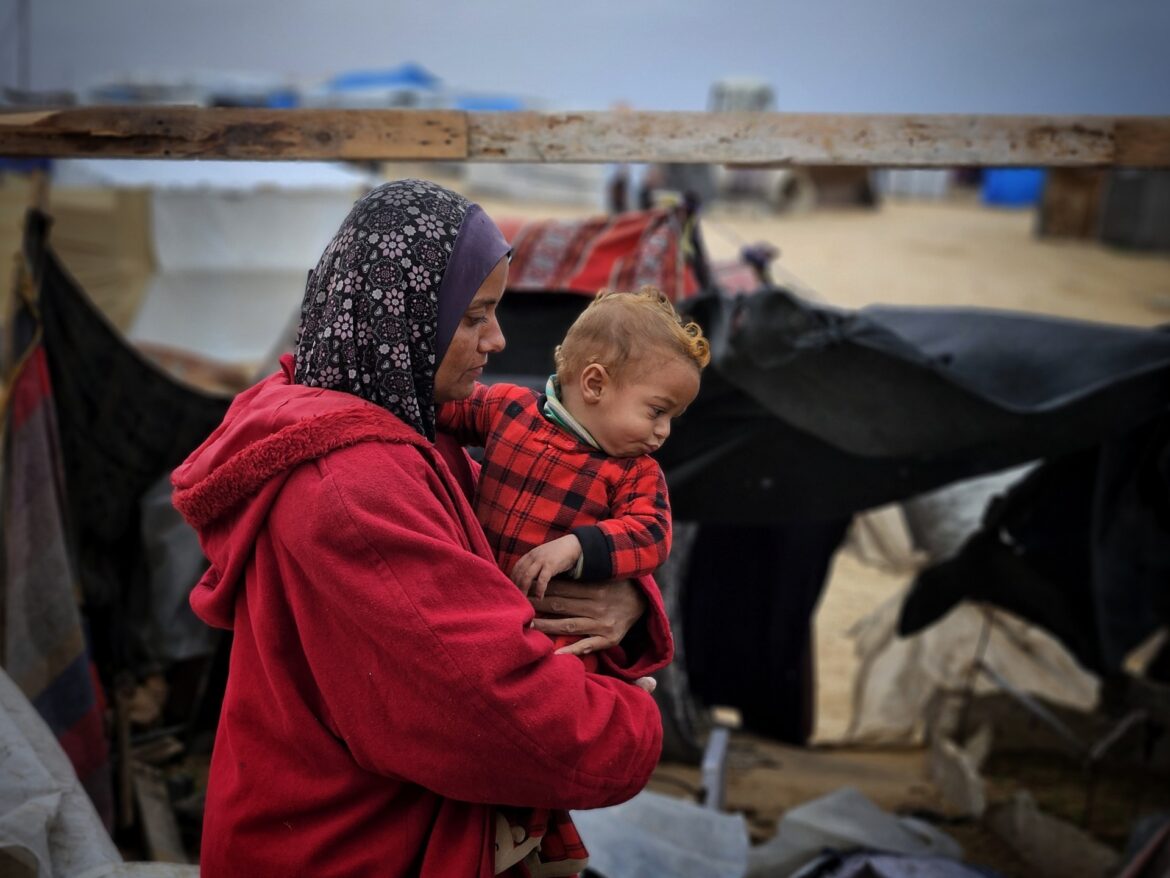Displaced Palestinians in the Gaza Strip are living in harsh humanitarian conditions, after rain water flooded their tents and winds blew through their shelter centers where they sought refuge after Israel destroyed their homes over the course of 15 months of genocide.
For the second year in a row, the majority of displaced people face difficulty staying inside primitive shelter centers and worn-out canvas tents, as they suffer from a severe shortage of basic necessities such as clothes, blankets, and heating methods.
Living conditions worsened with a severe shortage of food, water, and electricity, which led to thousands of displaced people, especially children, suffering from severe malnutrition, a stage that the United Nations described as a “station before death.”
At the end of August 2024, the United Nations revealed that about 15,000 children in the Gaza Strip suffer from malnutrition, including 2,288 children suffering from “severe acute” malnutrition, after examining about 240,000 children in the Strip.
The displaced complain of their children’s weak immunity due to hunger and malnutrition, which increases their risk of exposure to frost waves. Indeed, the number of deaths among those displaced due to the cold has increased in recent days, with 7 deaths recorded, including 6 children, most of them newborns.
The tents were soaked by the rain
According to the Palestinian Civil Defense Service in the Gaza Strip, dozens of tents have been submerged in rainwater since dawn on Monday, and rescue teams have received many calls for help from displaced persons whose tents and shelters were flooded by rainwater.
Due to the conditions resulting from the Israeli attack that has been ongoing for 15 months, families are suffering from living in the open after the shelter centers were destroyed and moved to places that are uninhabitable. As the tragic conditions continued, the Civil Defense appealed to international organizations to contribute to providing suitable shelters to protect the displaced from rainwater.
On the other hand, the displaced spoke of their suffering with the severe cold waves, as they no longer had the ability to protect themselves and their children from the cold after their clothes got wet as a result of the heavy rains.
Suha Barbakh, one of the displaced women in Khan Yunis, described how she began checking on her children for fear that they would die due to the extreme cold, explaining that she had abandoned her blanket to warm her children’s bodies. The displaced people also suffer from severe bone pain due to the extreme cold.
Islam Ahmed, who lives in a tent in the Al-Mawasi area in the city of Khan Yunis, said that rainwater drowned their basic supplies, such as blankets, mattresses, and clothes, making them unusable after being contaminated with mud. She added that the children, who were wet with water, had no opportunity to change their clothes to avoid the extreme cold, as they were “shivering from the cold and there was no way to warm them.”
She pointed out that the displaced tried to install their tents and surround them with sand before the onset of the depression to stop the entry of water, but the continuous precipitation prevented this.
According to the government media office in Gaza, 81% of the worn-out tents in the Strip threaten the lives of thousands of displaced people with the onset of winter. The presence of the displaced is concentrated in the Al-Mawasi area, which extends along the western coast of the Strip, where more than 1.7 million displaced people have taken refuge, according to Oxfam.
This area, which represents about a fifth of the Gaza Strip’s area, suffers from a shortage of water and food supplies amid difficult living conditions. Israel continues to bomb and destroy homes in Gaza, causing more human casualties and destruction.
Since the beginning of October 2023, Israel has been waging a genocidal war on the Gaza Strip with American support, resulting in the death and injury of about 154,000 Palestinians, most of whom are children and women, in addition to the disappearance of more than 11,000 people.
Israel faces increasing international criticism for committing war crimes and crimes against humanity in Gaza, as the International Criminal Court issued two arrest warrants against Israeli Prime Minister Benjamin Netanyahu and former Defense Minister Yoav Galant in November 2023.



